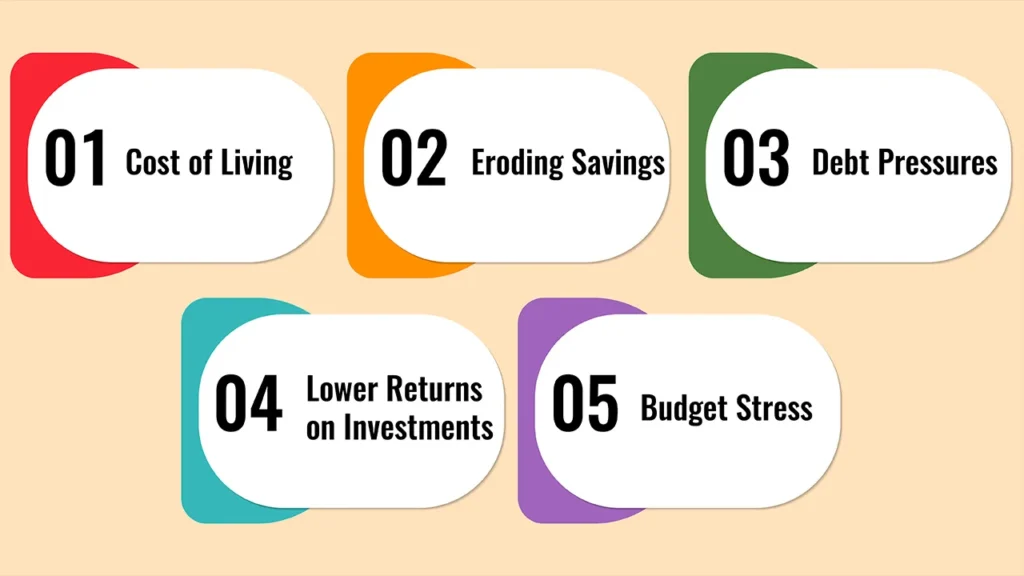Inflationary times present distinct financial challenges that make it particularly difficult for households to safeguard their purchasing power. You need to know how to manage your money during high inflation, which is key to maintaining financial stability and achieving lasting growth.
Inflation makes savings lose value more quickly, and it complicates the task of managing spending. You can manage inflationary pressures without sacrificing your financial objectives with some thoughtful advance planning, informed decision-making and strategic adjustments.
Understanding Inflation
How to survive The explanation Inflation is the rise in the general price level of goods and services. When inflation accelerates, each unit of currency buys fewer goods and services than it did before. To take an example: If inflation were 7 per cent, a basket of groceries that cost $100 last year would now cost $107.
Such a continuous price rise is nothing but damage to purchasing power and even reflects on savings, investments and how people manage their debts. Inflation can be high due to higher production costs, supply chain problems, excessive demand or monetary policies that are increasing the money supply.
The result for families and individuals is tighter budgets, with less capacity to save. The point of learning how to protect and manage your money during times when there is little purchasing power gives you the ability to retain wealth while still aiming for financial freedom over an extended period of time.
Key effects of high inflation on your wallet

- Cost of Living: Life’s necessities, including food, fuel, healthcare and shelter, increase in price.
- Eroding Savings: Storing cash in low-interest accounts means it loses value over time.
- Debt Pressures: Interest rates typically increase in periods of inflation, resulting in a higher cost of loans.
- Lower Returns on Investments: We rely heavily on fixed-income investments, which may not accommodate the increase in prices.
- Budget Stress: There is more and more pressure on households to focus on needs versus wants.
Each of these challenges needs to have pro active solutions so that money is allowed to work effectively even in stormy conditions.
Budgeting Strategies During Inflation
It all begins with a good budget for those attempting to keep pace with inflation. Budgeting will also help chart rising costs as well as helping pinpoint when cost-cutting decisions are necessary.
Keep Spending on a Short Leash: Keep records of every expense with digital tools or spreadsheets. Do the Basics First Lean out on your company first and figure out where there is discretionary spending.
- Needs vs. Wants: Cut down on discretionary spending. Judgement calls can also be reconsidered for spending on entertainment, items of luxury, or things that become popular seasonally.
- Use a Flexible Budget: A rapidly rising rate of inflation can frequently destabilise the prices. “That flexibility in categories like groceries or utilities helps you avoid the shock of overspending.”
When you develop a budget that you can control money with, the result will be more efficiently distributed funds and better margins.
Building an Emergency Fund
Uncertainty accompanies high inflation. Emergency funds also serve as a safety cushion to cover unexpected costs such as medical fees, job terminations or some random repairs. Most financial advisers suggest keeping between three and six months of essential expenses in an account that can be easily accessed.
While inflation diminishes the value of money in real terms, reserves deposited with a stable entity provide security against such crises. This fund keeps you from going into high-interest debt during tough times.
Smart Investment Choices
Investing during inflation means adjusting tried-and-true approaches. Fixed-income investment strategies, such as plain-vanilla savings accounts or bonds, struggle because they yield less than inflation. Instead, diversify intelligently:
- Stocks and Equity Funds: Equities do well over time against inflation since companies can raise their prices to keep pace with rising costs.
- Real Estate Investments: Property generally increases in value in the face of inflation, as it is a natural hedge against devaluing money.
- Commodities: Gold, silver and other commodities typically do well in rising price environments as safe havens.
- Inflation-Protected Securities: Some government debt, indexed to inflation and expressly perpetuating purchasing power.
Below is a table with investment options suitable for inflationary times.
| Asset Type | Inflation Impact | Suitability During High Inflation |
|---|---|---|
| Cash Savings | Rapid value erosion | Low – reserve for emergency only |
| Stocks & Equity Funds | Strong long-term growth | High – ideal hedge |
| Real Estate | Appreciates the prices | High – stable protection |
| Gold & Commodities | Value often rises | Medium-High – good hedge |
| Traditional Bonds | Returns outpaced by costs | Low – avoid unless inflation-protected |
| Inflation-Indexed Securities | Moves with inflation | High – preserves capital value |
This is diversification that will help you handle your money during high inflation, without risk getting out of whack.
Reducing Debt Burden
The other way to safeguard financial health during inflationary times is grappling with debt. Higher interest rates can make borrowing more expensive. Debt is best managed carefully to prevent repayments eating into crucial spending.
- Pay Off High-Interest Debts Fast: Credit card balances and personal loans come first.
- Refinance Long-Term Loans: Get solid fixed-rate mortgages while rates are still low.
- Stay Out of New, Unnecessary Debt: In uncertain times, borrowing should not be added to.
Debt management not only releases cash but also helps lower stress in what is already a difficult situation.
Protecting Purchasing Power
Inflation cuts what you can buy with the same amount of money. Preserving purchasing power is a matter of making better consumption decisions.
- Bulk Purchases: Stocking up on non-perishables reduces the impact of inflation.
- How to Save: Substitutes Select slightly cheaper of similar quality/buy generic
- Efficient Use of Energy: Utilities frequently go up with inflation; energy-saving makes them easy to handle.
- Rewards or Discounts: Enjoy special offers and discounts or collect reward points.
Every small step helps to fight off the erosion of money value and cushion living standards.
Long-Term Planning Strategies
Prolonged inflation cycles are not eternal. But it is imperative to prepare for the possibility of recurrence. Long-term planning will secure resilience in the face of future economic turbulence:
- Inflation-Proof Retirement: Spread retirement savings across stocks and products that are inflation-proof.
- Skills Upgrades for Income: Secure your income potential with investment in career upgrades or side businesses.
- Estate and Tax Planning: Inflation impairs wealth transfers and taxes; seek counsel to structure plans effectively.
Practical Example of Managing Money
Imagine a family making $50,000 a year. In high 8% inflation, what $50,000 is worth gets cut to $46K. They can help stabilize their finances by reducing discretionary spending by $3,000, directing the proceeds of an emergency fund they are maintaining in cash into equities and refinancing their home debt from variable to fixed rates.
That is an example of how pragmatics make things worse than they have to be in order to compensate for the destruction of value.
Conclusion
Did you have any? High inflation hits every household, yet effective strategies can help preserve wealth and make us more resilient. You can manage your money during high inflation while planning for long-term security by learning to budget wisely, supercharge emergency funds, invest smartly, reduce debt and safeguard purchasing power.
Money is devalued in times of economic turmoil, but through educated action, you plan for greater financial security.
Frequently Asked Questions
1. What does high inflation mean for my savings?
High inflation eats away at the real value of savings in cash or low-interest accounts. To keep money safe, look for investments that grow faster than inflation, such as stocks or inflation-indexed securities.
2. Is real estate a solid hedge against inflation?
Yes. Property values typically rise with inflation and rental income will adjust as well over a long time frame, providing an effective hedge against high inflation.
3. How do I allocate my budget in times of inflation?
Then prioritize the essentials, such as food, housing, utilities and health care. Control the purse strings on discretionary spending, deprioritise nonessentials and adjust budgets month by month in line with the pricing pressure.
4. Is debt inflationary or deflationary?
It depends on whether debt carries a fixed interest rate, and its real cost falls as inflation increases. But new borrowing tends to be more expensive, which is why future loans won’t have it easy.

Leave a Reply